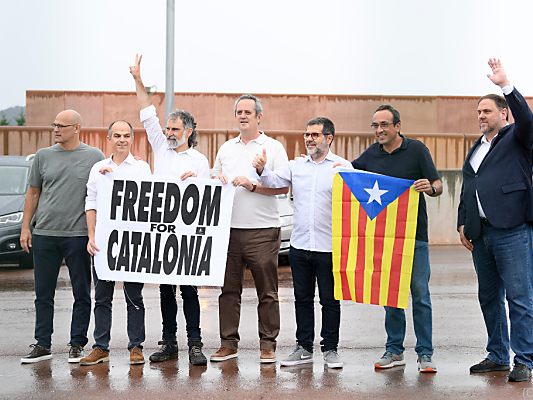
The released separatists want to keep fighting
© AFP
Nine Catalan independence supporters were released after three years in prison. Their supporters cheered on Wednesday when they were released from prison. The nine separatists, who were pardoned by the Spanish government upon their release, declared that the struggle for the independence of the conflict zone would continue. The left-wing minority government issued pardons regardless of criticism from the opposition.
“We will work abroad for freedom, amnesty, self-determination and the republic,” former Catalan Foreign Minister Raul Romeva said on Wednesday to the cheers of hundreds of his supporters. In front of the Lledoners prison near Barcelona, the regional president, Pierre Aragon, welcomed the pardon. The separatist demanded a green light from the central government in Madrid to hold a referendum on legal independence.
Romeva, former deputy regional director of Junqueras and five other leaders pardoned for the illegal secession attempt in the fall of 2017 carried a poster that read “Freedom for Catalonia”. “We will not be silenced,” they shouted.
The release of the pardons was accompanied by strong criticism from the opposition on Tuesday. Prime Minister Pedro Sanchez said the measure was necessary to “restore harmony and coexistence”.
“There is no better time for a reunion,” Sanchez wrote in a commentary in El Pais (Wednesday’s edition). Now a new chapter can be opened. “Without Spain, Catalonia would not be a prosperous and pluralistic European,” he added.
Conservative critics accuse Sanchez of trying to secure his power through amnesty. Those affected are still excluded from all political positions.
The Spanish ambassador to Vienna, Cristina Fraile, does not see a quick solution to the Catalonia conflict. “Wounds take time to heal,” Fraile said on Wednesday in an interview with members of the European Union of Journalists in Vienna. So the solution “will not be available in the next two years.”
“Amnesty will not be the solution, it will be part of the solution,” Fraile stressed. She emphasized that there was a need for more dialogue, but that it should not take place “outside the constitution”, as she emphasized the red line of the Spanish government. She said there could be a “financial solution in the end”, referring to the row between Barcelona and Madrid over the use of tax revenue. After all, the conflict started with a financial issue, which reminded her of then-conservative Prime Minister Mariano Rajoy’s refusal to grant Catalonia greater financial independence.
In the fall of 2019, the nine separatists were sentenced to prison terms of between 9 and 13 years in connection with the illegal independence referendum on 1 October 2017, among other charges of rioting and embezzlement of public funds. Three other convicted politicians have already served their sentences. The then regional president, Carles Puigdemont, evaded access to justice by moving to Belgium.

“Food practitioner. Bacon guru. Infuriatingly humble zombie enthusiast. Total student.”








More Stories
Kyiv: Russian Kursk offensive halted
US Presidential Election: Former US Government Officials Warn Against Donald Trump's Election
Netherlands wants to leave asylum system